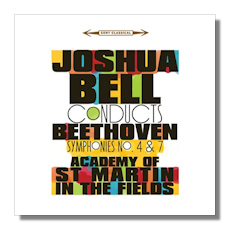
The Internet's Premier Classical Music Source
Related Links
- Beethoven Reviews
- Latest Reviews
- More Reviews
-
By Composer
-
Collections
DVD & Blu-ray
Books
Concert Reviews
Articles/Interviews
Software
Audio
Search Amazon
Recommended Links
Site News
 CD Review
CD Review
Ludwig van Beethoven

Joshua Bell Conducts
- Symphony #4 in B Flat Major, Op. 60
- Symphony #7 in A Major, Op. 92
Academy of St. Martin-in-the-Fields/Joshua Bell
Sony Classical 88725-49176-2 72m
From September, 2011 Joshua Bell has served as music director of the Academy of St. Martin-in-the-Fields. He is the first musician to hold that title since the orchestra's founding in 1958 by Sir Neville Marriner, who is now life president of this London-based chamber ensemble. Bell, as his admirers are well aware, first established himself as a world-class violinist. He still performs in that role and when he leads the Academy he typically does so from the concertmaster's chair. That's how he conducts these Beethoven performances. And how are those performances, you ask?
Well, I can say that both are astonishingly superb. The Fourth crackles with energy and is rich in meaningful detail and nuance. Everything is well balanced in the sound field and the sound reproduction is vivid and powerful. In fact, both in this symphony and #7, Sony provides sound so lifelike you'd be hard pressed to find more realistic sonics on any competing versions.
Bell's Seventh exudes the essence of Beethoven's purpose: rhythms are propulsive and infectious, the music seeming to dance right out of the speakers at you. The playing here, and in the Fourth for that matter, is accurate, with attacks crisp and articulation seemingly faultless. What is impressive about Bell throughout the symphonies is his attention to detail: dynamics exhibit all manner of gradations in both works and everything is spirited. There isn't a weak or pedestrian moment in either performance. Bell sees Beethoven here as lean and Classically-oriented, not as a Romantic or angst-obsessed composer. In short, he favors the more modern approach to his music, with brisk introductions in both symphonies' opening movements, fleet but not rushed tempos, and less use of legato than employed by many past conductors.
There are of course many fine versions of these symphonies by such conductors as Jochum, Szell, Toscanini, Abbado, Harnoncourt, Thielemann and countless others (forget Karajan, at least his later legato-laden renditions). But, while it's also true that few listeners are clamoring for more recordings of this repertory, these performances are nevertheless very welcome additions to the catalog. In fact, I would hope to see the other seven symphonies in the canon to complete Bell's cycle. Highest recommendations!
Copyright © 2013, Robert Cummings





















